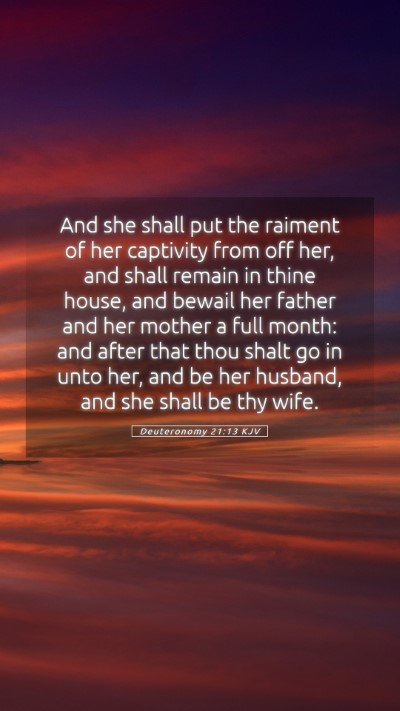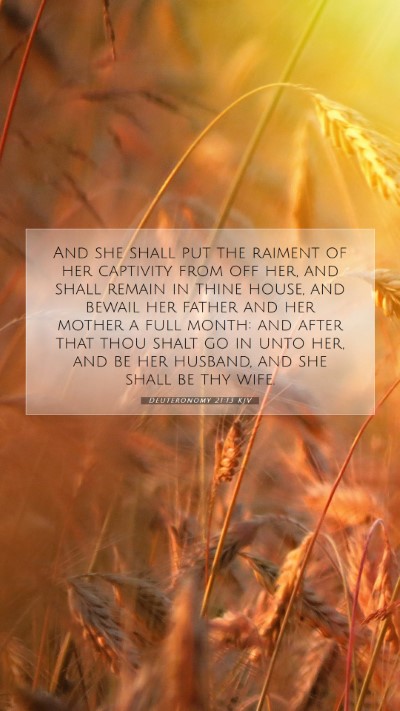Understanding Deuteronomy 21:13
Bible Verse: Deuteronomy 21:13
This verse is part of a broader set of laws addressing various issues pertaining to social justice, moral conduct, and community relations in ancient Israel. By examining the verse through the lens of public domain commentaries, we can gain a deeper understanding of its significance.
Overview of Deuteronomy 21:13
This passage illustrates a woman who has been captured in war and brought into the home of her captor. The directives given in this verse outline the process that should be followed, emphasizing the need for compassion while also establishing a degree of protection for her.
Commentary Insights
-
Matthew Henry:
Henry emphasizes that the law was intended to soften the harsh realities of war. He notes that this provision demonstrates God’s concern for even those who find themselves in vulnerable situations, such as captive women. The initial mourning period is significant, suggesting respect for her emotional state.
-
Albert Barnes:
Barnes adds that the law provided a framework for the treatment of captured individuals, preventing abuse and ensuring a degree of dignity. He highlights the importance of allowing the woman to express her grief, implying that her feelings and past must be acknowledged before any future commitments are made.
-
Adam Clarke:
Clarke discusses the practical implications of this law within the context of Israelite society. He points out that it protects the woman from becoming an object of scorn and recognizes her dignity as a human being. Clarke further notes that this law also served to remind Israel of their own past experiences of oppression and the need for compassion.
Significance and Application
The implications of Deuteronomy 21:13 extend beyond its historical context and into modern application:
- Compassion and Respect: This verse teaches the importance of treating all people with respect, regardless of their circumstances, serving as a potent reminder to approach those in distress with compassion.
- Recognizing Emotional Wounds: The directive to observe a mourning period acknowledges that grief and emotional trauma require time to heal, applicable in today's context where mental health is increasingly recognized as vital.
- Social Justice: The call for fair treatment within this verse reflects broader themes found throughout Scripture advocating for justice and care for the marginalized, an enduring principle for modern believers.
Bible Study Insights
For those engaging in Bible study groups or online discussions, the interpretations of Deuteronomy 21:13 can serve as rich material:
- How to interpret Bible verses concerning social justice.
- Understanding difficult Bible passages around warfare and ethics.
- Exploring historical context to provide depth in Bible study lessons.
Cross References
- Exodus 21:10-11: Discusses the rights of a woman in marriage and the implications of her status.
- Deuteronomy 15:12-15: Outlines principles of freedom for servants and the importance of remembering one's own past oppression.
- Zechariah 7:9-10: Advocates for truth, mercy, and compassion in dealings with others.
Conclusion
Deuteronomy 21:13 challenges readers to reflect on the values of compassion, dignity, and justice. Understanding this verse not only enriches individual Scripture analysis but also enhances the dynamics of Bible study groups seeking to explore the deeper meanings of Bible verses.
Call to Action: As you explore the meaning behind Bible verses, consider engaging with various Bible study tools and resources to deepen your understanding of Scripture. Many lessons derived from such verses can be applied to daily life, guiding your interactions with others.


